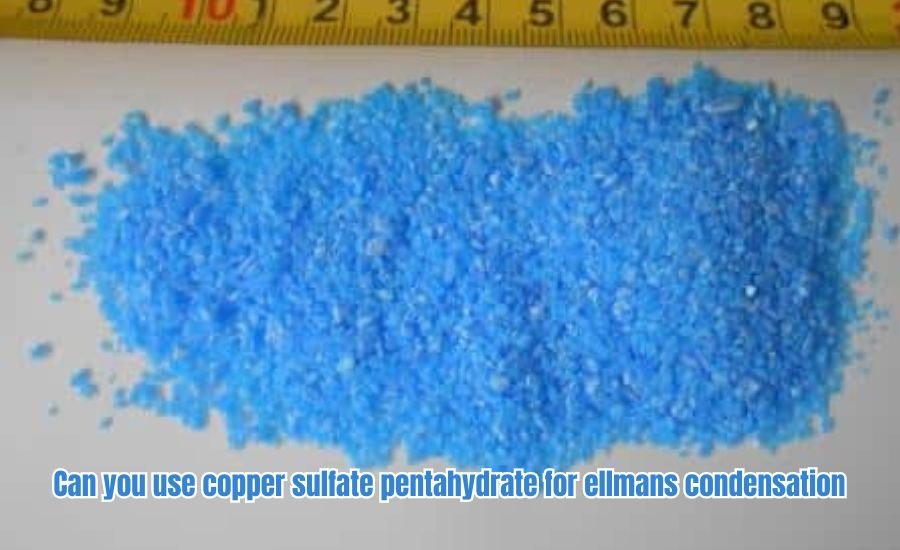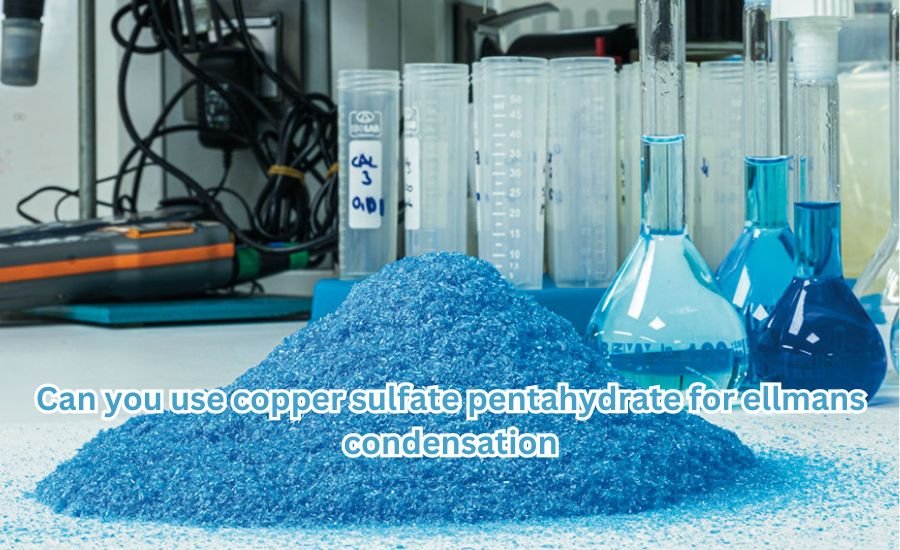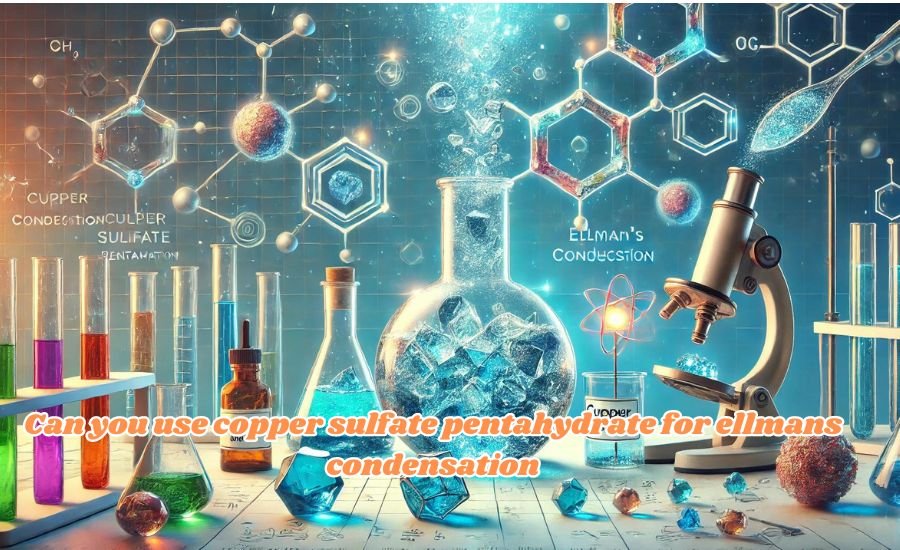Can you use copper sulfate pentahydrate for ellmans condensation? This question is important for many scientists and chemists who want to make new chemicals. Ellman’s condensation is a special reaction that helps form strong bonds between carbon atoms. Using a good catalyst can make this process better and faster.
Copper sulfate pentahydrate is a blue crystal that many people can find easily. Scientists are curious to know if it can help in Ellman’s condensation. In this blog post, we will explore how copper sulfate pentahydrate might work in this chemical reaction and if it can really be useful.
What is Ellmans Condensation?
Ellman’s condensation is a special chemical reaction. It helps create new carbon-carbon bonds, which are very important in making many different chemicals. This reaction usually happens when an aldehyde or ketone combines with another molecule. Scientists use this reaction in organic chemistry to make complex compounds that are useful in medicines and other products.
In the world of chemistry, making these bonds can be tricky. However, with the right tools, like catalysts, the process can be much easier. Catalysts help speed up reactions without being used up themselves. They make it possible to create new chemicals quickly and efficiently.
Many researchers are excited about Ellman’s condensation because it can help in the development of new drugs. With this reaction, they can design and produce compounds that are important for healthcare. Understanding how it works is vital for chemists who want to innovate and create new materials.
Understanding Copper Sulfate Pentahydrate: What Is It?

Copper sulfate pentahydrate, often written as CuSO₄·5H₂O, is a blue crystal. It is made up of copper, sulfur, and oxygen, along with water. Many people can find this compound easily in stores or laboratories. It has several uses in agriculture, chemistry, and even art.
When dissolved in water, copper sulfate pentahydrate splits into copper ions and sulfate ions. These ions can react with other chemicals. Because of this, scientists are curious about how they can use copper sulfate pentahydrate as a catalyst in various reactions, including Ellman’s condensation.
This compound is not just useful; it’s also affordable. Many researchers like to use it because they can easily get it without spending too much money. This makes copper sulfate pentahydrate an interesting option for scientists who want to improve chemical reactions.
How Does Ellman’s Condensation Work?
Ellman’s condensation is a fascinating chemical reaction that helps scientists create new carbon-carbon bonds. Think of it as a way to build bigger and more complex molecules, which are super important in fields like medicine and materials science. Let’s dive into how this cool reaction happens step by step!
Step-by-Step Process
To kick things off, we need two main players: an aldehyde or a ketone and a nucleophile. The aldehyde or ketone acts like a target, waiting to react. When we mix these two together, the magic begins! The nucleophile swoops in and attacks the carbon atom of the aldehyde or ketone, which is a bit like a game of tag where the nucleophile wants to join the fun. This attack is a crucial moment in the reaction because it starts to form a new bond between carbon atoms.
After the nucleophile jumps in, a temporary structure called a reaction intermediate forms. It’s like a pause in the action before we get to the exciting conclusion. At this point, adding a catalyst can really help speed things up. Scientists are especially curious about using copper sulfate pentahydrate as a potential catalyst to make this reaction even more efficient.
The Role of Copper Sulfate Pentahydrate
Once all the necessary steps are completed, we finally get our new compound, often a β-dicarbonyl compound. This compound is a superstar in the chemical world, as it can be used to make medicines, tasty flavors, and a whole bunch of other useful chemicals. So, in a nutshell, Ellman’s condensation is all about teamwork—combining different molecules to create something entirely new and valuable!
By understanding the mechanism of Ellman’s condensation, scientists can find new ways to enhance the reaction. For example, exploring how copper sulfate pentahydrate affects the process can lead to improved yields and more efficient reactions. This is a big deal in organic chemistry, where creating complex molecules efficiently is the name of the game!
Can You Use Copper Sulfate Pentahydrate for Ellman’s Condensation? An Overview
Many scientists are exploring the possibility of using copper sulfate pentahydrate for Ellman’s condensation. They are curious if this blue crystal can act as a helpful catalyst in the process. Using a good catalyst can make a big difference in how quickly and efficiently reactions occur.
Research has shown that copper ions in copper sulfate pentahydrate may help stabilize reaction intermediates. This means that the reaction might happen more smoothly, leading to better yields of the desired products. However, researchers still need to conduct more experiments to understand its full potential.
While copper sulfate pentahydrate is accessible, scientists are also comparing it to other specialized catalysts. These specialized catalysts might perform better in certain situations. Finding the best catalyst for Ellman’s condensation is an ongoing challenge for chemists.
The Importance of Catalysts in Chemical Reactions
Catalysts play a crucial role in chemical reactions. They help speed up reactions without getting used up in the process. This is very helpful in making reactions happen faster and more efficiently. For many scientists, catalysts are essential tools in their work.
In the case of Ellman’s condensation, using a good catalyst can lead to better results. It can help create the necessary carbon-carbon bonds that are important in many organic compounds. Understanding how different catalysts work is a big part of improving these chemical reactions.
Researchers are always looking for new catalysts to use in their experiments. They want to find options that are effective, affordable, and easy to find. Copper sulfate pentahydrate might be one of those options worth exploring further.
The Role of Copper in Copper Sulfate Pentahydrate

The copper ion in copper sulfate pentahydrate is key to its potential as a catalyst. This ion can help facilitate electron transfers in chemical reactions. It acts as a Lewis acid, which means it can accept electrons and help stabilize reaction intermediates.
Copper sulfate pentahydrate has a unique structure that allows it to interact with other molecules effectively. When it dissolves in water, it releases copper ions that can participate in various reactions. This property makes it a valuable compound in many chemical processes.
By studying the role of copper in copper sulfate pentahydrate, researchers can better understand how it can be used in Ellman’s condensation. This knowledge may lead to new ways of making important organic compounds more efficiently.
Potential Benefits of Using Copper Sulfate Pentahydrate in Ellman’s Condensation
Using copper sulfate pentahydrate in Ellman’s condensation could bring several benefits. One of the main advantages is cost-effectiveness. This compound is affordable and widely available, making it an attractive option for many laboratories.
Additionally, copper sulfate pentahydrate may help increase the efficiency of the reaction. By speeding up the process, chemists can save time and resources. This can be especially important in industrial settings, where large-scale production is required.
Furthermore, using this catalyst may lead to better selectivity in the reaction. Improved selectivity means that chemists can obtain more of the desired product and reduce waste. This can make chemical processes more sustainable and environmentally friendly.
How to Use Copper Sulfate Pentahydrate in Your Experiments
Using copper sulfate pentahydrate in experiments can be exciting and educational! Here are some simple points to guide you through the process:
1. Gather Your Materials
- Make sure you have copper sulfate pentahydrate (CuSO₄·5H₂O), your reaction components (like aldehydes or ketones), and any necessary solvents.
- Don’t forget safety gear such as gloves, goggles, and a lab coat!
2. Prepare the Solution
- Dissolve a measured amount of copper sulfate pentahydrate in water to create a solution.
- Stir the solution gently until all the crystals have dissolved completely.
3. Set Up Your Reaction
- In a clean reaction flask, mix your aldehyde or ketone with the nucleophile you want to use.
- Add the copper sulfate pentahydrate solution to your reaction mixture. This is where the magic happens!
4. Monitor the Reaction
- Heat the reaction mixture gently if needed, while keeping an eye on the temperature.
- Use a stirrer to keep everything well mixed and help the reaction proceed smoothly.
5. Observe Changes
- Watch for color changes, bubbles, or other signs that the reaction is happening.
- Take notes on what you observe, as this information will be valuable for your analysis.
6. Analyze Your Product
- Once the reaction is complete, you may need to purify the product using methods like filtration or distillation.
- Test your final product to confirm that the reaction worked, using techniques like chromatography or spectroscopy.
7. Dispose of Waste Properly
- Follow your lab’s guidelines for disposing of any leftover chemicals or waste.
- Ensure that any leftover copper sulfate solution is disposed of safely to protect the environment.
8. Review and Learn
- Reflect on your experiment. What worked well? What could be improved?
- Document your findings and share them with others to contribute to the learning process!
By following these steps, you can safely and effectively use copper sulfate pentahydrate in your experiments and explore the exciting world of chemical reactions!
Comparing Copper Sulfate Pentahydrate to Other Catalysts
When looking at catalysts for Ellman’s condensation, it’s essential to compare different options. Copper sulfate pentahydrate is just one of many catalysts that chemists can use. Some specialized copper-based catalysts may have better performance in certain reactions.
Researchers should evaluate how well copper sulfate pentahydrate performs compared to these specialized catalysts. They can do this by conducting experiments to see which catalyst yields better results. This comparison helps scientists find the most effective catalysts for their needs.
In the long run, finding the best catalyst can save time and resources. By understanding the strengths and weaknesses of various catalysts, researchers can make informed choices for their experiments.
Safety First: Handling Copper Sulfate Pentahydrate

When working with copper sulfate pentahydrate, it’s important to follow proper safety procedures. This chemical can be harmful if swallowed, inhaled, or if it comes into contact with the skin.
Wearing personal protective equipment (PPE) is essential. Lab coats, gloves, and safety goggles help protect scientists from exposure. It’s also important to work in a well-ventilated area and follow any additional safety guidelines provided by the lab.
If an accident occurs, it’s crucial to know how to respond. Researchers should be aware of the appropriate first aid measures in case of exposure. By being prepared, they can ensure a safer working environment for everyone.
Case Studies: Success Stories with Copper Sulfate Pentahydrate
Many researchers have explored the potential of copper sulfate pentahydrate in various chemical reactions. Some case studies show promising results when using this compound as a catalyst. These studies highlight its effectiveness and advantages in specific applications.
One success story involves using copper sulfate pentahydrate in organic synthesis. Researchers found that it could enhance the efficiency of certain reactions, leading to higher yields of desired products. This finding encourages more scientists to consider using copper sulfate pentahydrate in their work.
More case studies are needed to fully understand its capabilities. However, initial findings suggest that copper sulfate pentahydrate has the potential to be a valuable tool in organic chemistry.
Challenges of Using Copper Sulfate Pentahydrate for Ellman’s Condensation
While copper sulfate pentahydrate shows promise, there are also challenges to consider. One challenge is that it may not always perform as well as specialized catalysts. In some cases, researchers may find that its catalytic activity is lower than expected.
Another challenge is the specific reaction conditions required for Ellman’s condensation. Not all catalysts work well under the same conditions. This means that researchers must carefully optimize their experiments to get the best results with copper sulfate pentahydrate.
Despite these challenges, scientists are optimistic about further exploring copper sulfate pentahydrate. Ongoing research can help address these issues and improve its application in chemical reactions.
Future Research on Copper Sulfate Pentahydrate and Organic Chemistry
The future of research on copper sulfate pentahydrate looks bright. Scientists are eager to discover more about its potential as a catalyst. By conducting more experiments and studies, they hope to find new applications for this compound in organic chemistry.
Researchers are particularly interested in understanding how copper sulfate pentahydrate interacts with other chemicals. This knowledge can lead to improved reaction conditions and outcomes. As scientists continue their investigations, they may uncover innovative uses for copper sulfate pentahydrate.
Additionally, comparing it to other catalysts can provide valuable insights. By identifying the strengths and weaknesses of copper sulfate pentahydrate, researchers can make better choices for their experiments.
Final Thoughts: Can You Use Copper Sulfate Pentahydrate for Ellman’s Condensation?

In conclusion, the question remains: can you use copper sulfate pentahydrate for Ellman’s condensation? The answer is yes, it has potential! While it may not be the best catalyst for every situation, its affordability and accessibility make it an appealing option for many researchers.
By exploring its capabilities, scientists can gain a deeper understanding of its role in chemical reactions. Ongoing research can help reveal its strengths and applications in organic chemistry. As scientists continue to investigate, they may find new ways to use copper sulfate pentahydrate effectively.
The journey of discovery in chemistry is exciting. Researchers are always looking for new tools and methods to improve their work. Copper sulfate pentahydrate may very well be one of those tools that can lead to important advancements in the field.
Conclusion
In summary, using copper sulfate pentahydrate for Ellman’s condensation is an exciting idea. This blue crystal could help make chemical reactions faster and easier. Scientists are eager to learn more about how it works and if it can improve the way they create important compounds. With more research, copper sulfate pentahydrate may become a popular choice in many laboratories.
The journey of discovery in chemistry is always happening! Researchers are always looking for new ways to make their experiments better. By studying how copper sulfate pentahydrate can be used, scientists might find new tools to create amazing things. It’s a great time to explore the possibilities in the world of chemistry!
Get More Information: Alternativewaynet Steve
FAQs
Q: What is Ellman’s condensation?
A: Ellman’s condensation is a chemical reaction that helps create new carbon-carbon bonds, which are important in making various chemicals.
Q: What is copper sulfate pentahydrate?
A: Copper sulfate pentahydrate is a blue crystal made of copper, sulfur, and water, often used in laboratories and agriculture.
Q: Can you use copper sulfate pentahydrate in other reactions?
A: Yes, copper sulfate pentahydrate can be used in different chemical reactions, not just Ellman’s condensation.
Q: Why are catalysts important in chemistry?
A: Catalysts help speed up chemical reactions without being used up, making the processes more efficient.
Q: Is copper sulfate pentahydrate safe to handle?
A: It can be harmful if swallowed or if it touches your skin, so it’s important to wear gloves and goggles when handling it.
Q: How do scientists test new catalysts?
A: Scientists conduct experiments to see how well a catalyst works in different reactions and compare it to other catalysts.
Q: What are the benefits of using copper sulfate pentahydrate?
A: It is affordable, easily available, and may increase the efficiency of chemical reactions, making it a good choice for many researchers.
